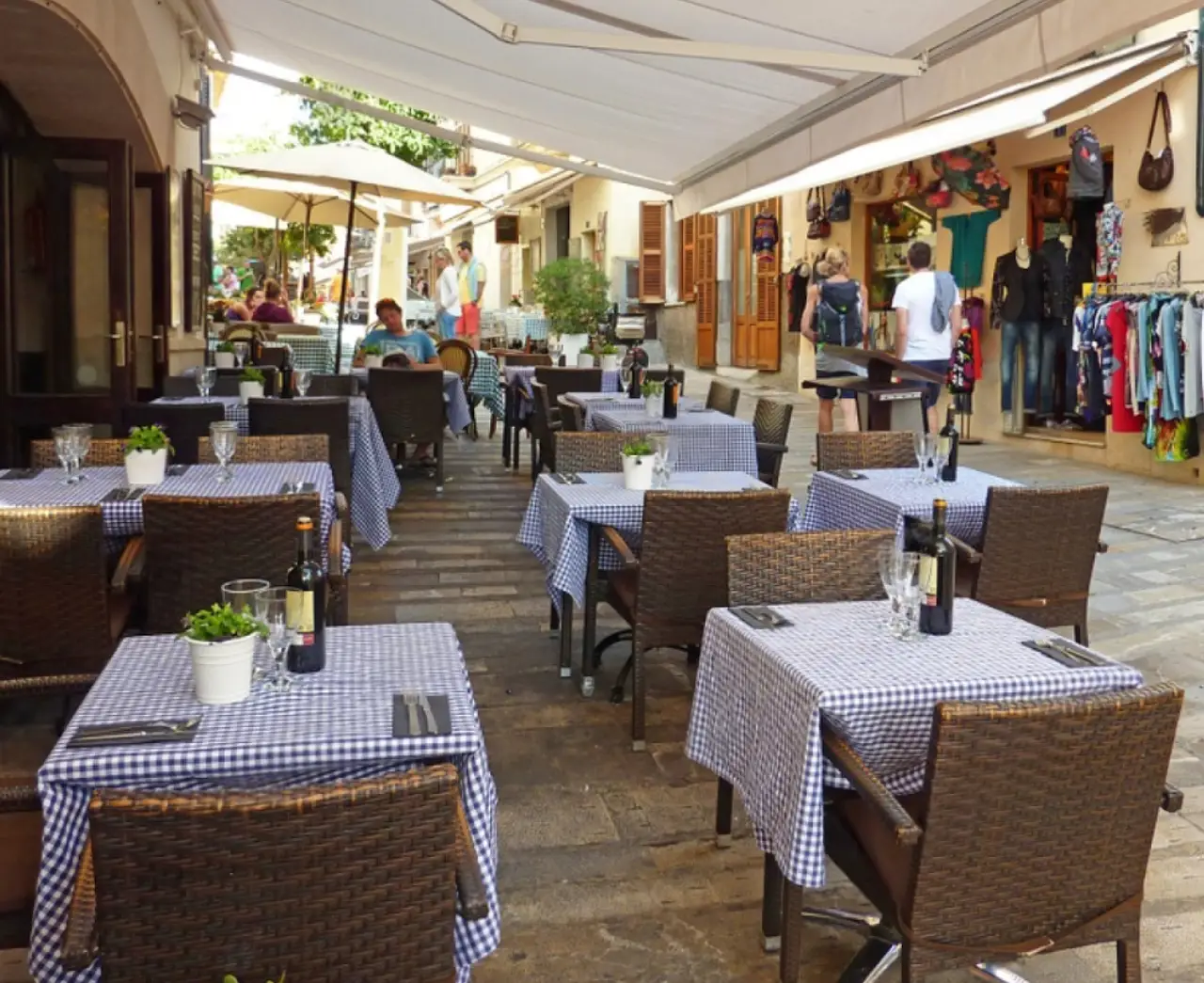
Tips on How to Start a Restaurant with a Partner in Mallorca
Starting a restaurant with a partner in Palma de Mallorca can be an exciting and profitable opportunity, but it’s essential to do it strategically and with good planning. Like any business, the key to success lies in having a shared vision, a clear approach, and an adequate legal framework. Here are some practical and fundamental tips for starting your restaurant with a partner in Palma de Mallorca.
1. Choose the Right Partner
Choosing the right partner is a determining factor in the success of the business. It’s not just about personal affinity, but professional compatibility. Look for someone who shares your vision and values, but also brings complementary skills. It’s essential that your partner has knowledge or experience in areas you don’t master, such as financial management, marketing, or experience in the hospitality sector.
Before making a decision, ensure that your partner can contribute with capital, resources, or a network of contacts to help the business grow. If you’re unsure how to do this, you can consult a business consultancy in Palma de Mallorca for advice on structuring the business relationship with your partner.
2. Define the Type of Company
One of the first decisions you’ll need to make when starting a restaurant with a partner is what type of company you will form. The most common legal structures for this type of business are:
- Limited Liability Company (SL): Limits liability to the capital contributed by each partner. It is the most commonly used option for those looking to protect their personal assets.
- Civil Partnership (SC): It is more flexible, but it involves unlimited personal liability for debts.
- Community of Goods: This legal structure is simple to establish but, like the SC, has unlimited partner liability.

If you decide to go for a Limited Liability Company (SL), it’s important to have an expert help you create an SL in Palma de Mallorca and guide you through the necessary procedures for its establishment.
3. Choose the Right Location
The choice of location is one of the most crucial factors for the success of your restaurant. Make sure the location meets your expectations both in terms of space and location. The location must be strategic to attract your target audience, considering factors like accessibility, foot traffic, and competition in the area.
Additionally, verify that the property complies with all urban planning and safety regulations. If the property doesn’t have the necessary opening license, you will need to obtain it before starting operations. This license is essential for legally opening the restaurant and ensuring the premises meet all safety and health requirements. If you have questions about the procedures or how to apply for an opening license in Palma de Mallorca, a business consultancy in Palma de Mallorca can guide you and help you comply with all legal requirements.
4. Draft a Partnership Agreement
It’s crucial that before starting the business, you draft and sign a partnership agreement. This agreement should outline aspects such as each partner’s contributions, profit and loss distribution, and each party’s roles and responsibilities. It should also establish decision-making mechanisms and conflict resolution procedures. The agreement should include clauses for managing partner exits or the sale of shares.
Even if you have a friendship with your partner, never leave this step to chance. A partnership agreement is the foundation for avoiding misunderstandings and protecting both parties’ interests.
5. Plan Management and Operations
It’s important to clearly define how the day-to-day operations of the restaurant will be managed. To avoid future conflicts, establish roles and responsibilities for each partner, so there are no overlaps in tasks. Assign who will handle administrative tasks, supplier relations, personnel management, and financial aspects.
Also, it should be clear what will happen in the event of disagreements between partners. A clear management plan will help keep the restaurant running efficiently.
6. Create a Business Plan and Market Research
Creating a detailed business plan is essential for ensuring the restaurant’s success. In this plan, you should include a competitive analysis, define your value proposition, and clarify the type of cuisine, target audience, and restaurant location. You should also include cash flow projections and realistic financial forecasts that will help assess the business’s long-term viability.
If you have questions about structuring this plan, you can count on the support of a business consultancy in Palma de Mallorca to help with the procedures and financial planning.
7. Complete Legal and Administrative Procedures
Once the business structure is defined, make sure to comply with all legal procedures. If you have chosen a Limited Liability Company (SL), you’ll need to register the company in the Commercial Registry, obtain the CIF, register with the tax authorities, and apply for the necessary licenses to operate in Palma de Mallorca. You will also need to prepare the company’s articles of association and the required books to manage the business’s administrative tasks.
It’s important to get professional advice to ensure that all procedures are properly completed and to avoid legal issues in the future.
8. Communication and Transparency
Always maintain open and transparent communication with your partner. This is vital for both of you to stay informed about the restaurant’s progress, any issues that may arise, and the financial results. Set up regular meetings or reports to review business performance and adjust strategies as needed.
9. Plan for Possible Exits
It’s important to define from the start how partner exits, whether voluntary or involuntary, will be managed. Establish in the partnership agreement how shares will be sold or how new partners will be brought in to ensure that no misunderstandings or conflicts occur in the future.
Common Mistakes to Avoid
- Not putting everything in writing: It’s essential to have all agreements in writing to avoid legal issues.
- Partnering up just for friendship or to avoid hiring staff: The partnership should have a solid professional foundation.
- Not clearly defining roles and responsibilities: This can lead to unnecessary conflicts.
- Not having conflict resolution or exit mechanisms: Disagreements are inevitable, so these should be clearly outlined from the beginning.
Conclusion
Starting a restaurant with a partner in Palma de Mallorca can be a great opportunity, but only if well-founded decisions are made from the start. It’s essential to choose the right partner, clearly define the type of company, draft a solid partnership agreement, and complete all legal and administrative procedures. Also, make sure to choose an appropriate location and obtain the necessary opening license to operate legally.
If you’re thinking about registering as an autonomous worker in Palma de Mallorca or creating an SL in Palma de Mallorca for your restaurant, having the support of a business consultancy in Palma de Mallorca will help you manage all the legal and administrative processes, allowing you to focus on the growth of your business.

Tips on How to Start a Restaurant with a Partner in Mallorca
Starting a restaurant with a partner in Palma de Mallorca can be an exciting and profitable opportunity, but it’s essential to do it strategically and with good planning. Like any business, the key to success lies in having a shared vision, a clear approach, and an adequate legal framework. Here are some practical and fundamental tips for starting your restaurant with a partner in Palma de Mallorca.
1. Choose the Right Partner
Choosing the right partner is a determining factor in the success of the business. It’s not just about personal affinity, but professional compatibility. Look for someone who shares your vision and values, but also brings complementary skills. It’s essential that your partner has knowledge or experience in areas you don’t master, such as financial management, marketing, or experience in the hospitality sector.
Before making a decision, ensure that your partner can contribute with capital, resources, or a network of contacts to help the business grow. If you’re unsure how to do this, you can consult a business consultancy in Palma de Mallorca for advice on structuring the business relationship with your partner.
2. Define the Type of Company
One of the first decisions you’ll need to make when starting a restaurant with a partner is what type of company you will form. The most common legal structures for this type of business are:
- Limited Liability Company (SL): Limits liability to the capital contributed by each partner. It is the most commonly used option for those looking to protect their personal assets.
- Civil Partnership (SC): It is more flexible, but it involves unlimited personal liability for debts.
- Community of Goods: This legal structure is simple to establish but, like the SC, has unlimited partner liability.

If you decide to go for a Limited Liability Company (SL), it’s important to have an expert help you create an SL in Palma de Mallorca and guide you through the necessary procedures for its establishment.
3. Choose the Right Location
The choice of location is one of the most crucial factors for the success of your restaurant. Make sure the location meets your expectations both in terms of space and location. The location must be strategic to attract your target audience, considering factors like accessibility, foot traffic, and competition in the area.
Additionally, verify that the property complies with all urban planning and safety regulations. If the property doesn’t have the necessary opening license, you will need to obtain it before starting operations. This license is essential for legally opening the restaurant and ensuring the premises meet all safety and health requirements. If you have questions about the procedures or how to apply for an opening license in Palma de Mallorca, a business consultancy in Palma de Mallorca can guide you and help you comply with all legal requirements.
4. Draft a Partnership Agreement
It’s crucial that before starting the business, you draft and sign a partnership agreement. This agreement should outline aspects such as each partner’s contributions, profit and loss distribution, and each party’s roles and responsibilities. It should also establish decision-making mechanisms and conflict resolution procedures. The agreement should include clauses for managing partner exits or the sale of shares.
Even if you have a friendship with your partner, never leave this step to chance. A partnership agreement is the foundation for avoiding misunderstandings and protecting both parties’ interests.
5. Plan Management and Operations
It’s important to clearly define how the day-to-day operations of the restaurant will be managed. To avoid future conflicts, establish roles and responsibilities for each partner, so there are no overlaps in tasks. Assign who will handle administrative tasks, supplier relations, personnel management, and financial aspects.
Also, it should be clear what will happen in the event of disagreements between partners. A clear management plan will help keep the restaurant running efficiently.
6. Create a Business Plan and Market Research
Creating a detailed business plan is essential for ensuring the restaurant’s success. In this plan, you should include a competitive analysis, define your value proposition, and clarify the type of cuisine, target audience, and restaurant location. You should also include cash flow projections and realistic financial forecasts that will help assess the business’s long-term viability.
If you have questions about structuring this plan, you can count on the support of a business consultancy in Palma de Mallorca to help with the procedures and financial planning.
7. Complete Legal and Administrative Procedures
Once the business structure is defined, make sure to comply with all legal procedures. If you have chosen a Limited Liability Company (SL), you’ll need to register the company in the Commercial Registry, obtain the CIF, register with the tax authorities, and apply for the necessary licenses to operate in Palma de Mallorca. You will also need to prepare the company’s articles of association and the required books to manage the business’s administrative tasks.
It’s important to get professional advice to ensure that all procedures are properly completed and to avoid legal issues in the future.
8. Communication and Transparency
Always maintain open and transparent communication with your partner. This is vital for both of you to stay informed about the restaurant’s progress, any issues that may arise, and the financial results. Set up regular meetings or reports to review business performance and adjust strategies as needed.
9. Plan for Possible Exits
It’s important to define from the start how partner exits, whether voluntary or involuntary, will be managed. Establish in the partnership agreement how shares will be sold or how new partners will be brought in to ensure that no misunderstandings or conflicts occur in the future.
Common Mistakes to Avoid
- Not putting everything in writing: It’s essential to have all agreements in writing to avoid legal issues.
- Partnering up just for friendship or to avoid hiring staff: The partnership should have a solid professional foundation.
- Not clearly defining roles and responsibilities: This can lead to unnecessary conflicts.
- Not having conflict resolution or exit mechanisms: Disagreements are inevitable, so these should be clearly outlined from the beginning.
Conclusion
Starting a restaurant with a partner in Palma de Mallorca can be a great opportunity, but only if well-founded decisions are made from the start. It’s essential to choose the right partner, clearly define the type of company, draft a solid partnership agreement, and complete all legal and administrative procedures. Also, make sure to choose an appropriate location and obtain the necessary opening license to operate legally.
If you’re thinking about registering as an autonomous worker in Palma de Mallorca or creating an SL in Palma de Mallorca for your restaurant, having the support of a business consultancy in Palma de Mallorca will help you manage all the legal and administrative processes, allowing you to focus on the growth of your business.
Seguir leyendo
Gestoría en Palma de Mallorca.
Si buscas una gestoría cerca de ti, asesoramos a empresas en el ámbito laboral, fiscal y contable. También somos una gestoría administrativa en Palma y realizamos traspasos de vehículos.













